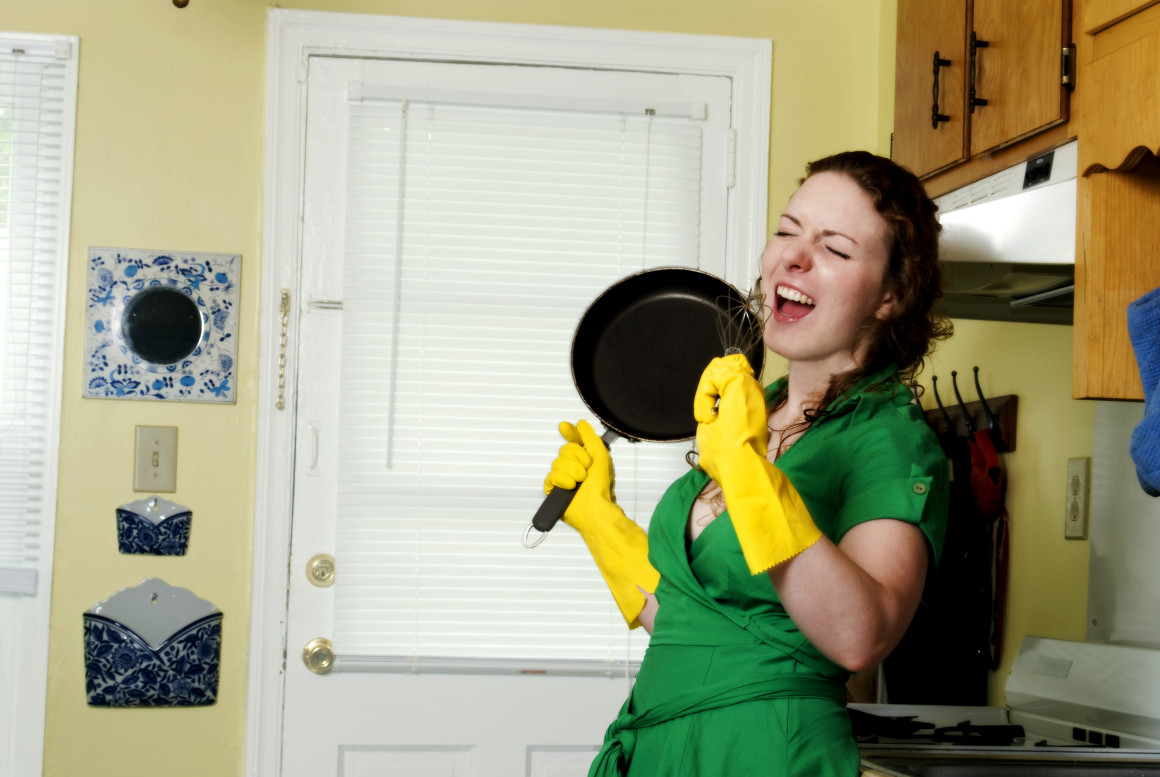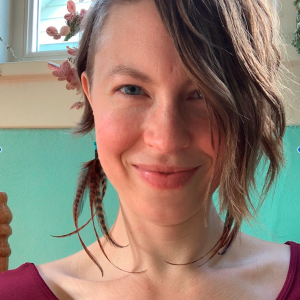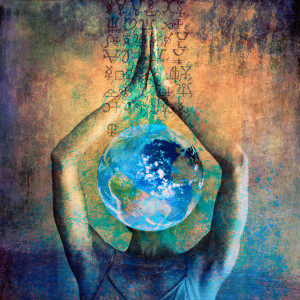Barbara McAfee was a quiet kid. She had a big phobia about being heard. She came from a musical family, yet she believed that was for them, not for her. But then in college a friend overheard her singing and gossipped to another friend that Barbara had talent. Thanks to this gossip, Barbara was invited to sing in a trio. For seven years she was terrified every time she sang in front of people. She felt like she was going to die. But eventually she got sick of being scared.
Barbara started therapy right as she began studying with her first voice teacher. She began to let out all the feelings that held her voice down. Shortly after, she began to study with the Roy Hart Centre, which she says completely blew the lid off her story of what she believed about her voice.
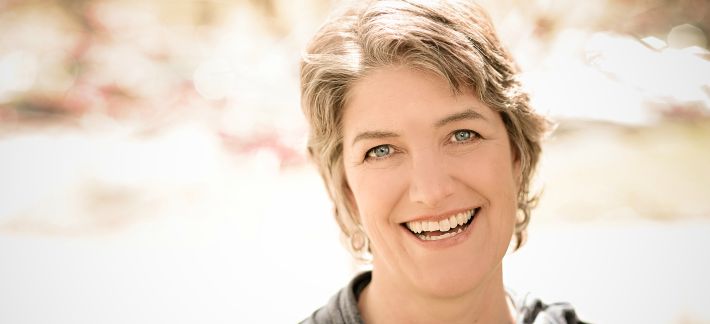 Thirty years later, Barbara is a singer who has created seven solo albums. She is a speaker, author, and voice coach for leaders, artists, and change makers. She believes that when one person sets her voice free, she can set many other voices free.
Thirty years later, Barbara is a singer who has created seven solo albums. She is a speaker, author, and voice coach for leaders, artists, and change makers. She believes that when one person sets her voice free, she can set many other voices free.
I met Barbara because I was one of those quiet kids myself. My story was that my voice was weak. I was ashamed, and I resigned myself to never singing or being heard. This was a big hurdle in my career (not to mention my relationship with myself) until one of my teachers assigned me to get vocal training. The work I did with Barbara incited a total shift in my relationship with my voice. So I reconnected with her now, five years later, in order to share some of the wisdom that she offered me.
Our culture tends to look at music and singing like “either you’re a professional or you don’t do it.” What would you say to that? It seems like this belief cuts us off from the whole vocal inquiry so early.
It’s very strange that we think we need to be perfect at this before we even try. I live on the Mississippi River bike path, and I see hundreds of people biking by—they’re not on the Tour de France. There’s all these ways—cooking, gardening, sports—that people enjoy being amateurs at something. But there’s something about music, especially singing, that seems so mysterious. As though you’re using some other mechanisms than when you talk. It’s not different; it’s just slow, structured talking. I’ve been an avid song leader because I believe singing is a human right. It’s a part of being a human being. There’s singing in every culture, and there’s a reason for that.
There can be so much resistance and fear with our voices. You encourage us to let go of that and just jump in.
It’s about the story of who you think you are. The stories we have about ourselves are way too small and most of them have been formed by unreliable sources. Some teacher who put a curse on us in second grade, who told us we have a tin ear.
I had a woman here last week who is 47 years old, and when she was 5 her mother and sister told her she was tone-deaf. She’s not tone-deaf! Far from it. Every note I played on the piano, it was like oh my god! We both cried. Forty-two years of a lie, and then on top of that is all the auto-tuning we hear. I’m in the recording studio, I know what they can do in there. They can fix anything. So we hear these voices that are airbrushed just like the models. They do the same thing to our identity as a voice that images of airbrushed models do for our sense of our own bodies. So we end up feeling completely insecure and doing all these weird things in response to something that isn’t even real. That isn’t how people sound. Isn’t that sad?
After listening to people’s voices for 20 years, I have realized how many of these things are transpersonal; they’re cultural. I hear the same theme come up, about a certain kind of shame and a certain kind of hatred of the feminine, of feeling, of the intuition, of the heart. All these sounds come rising up out of our bodies. All this truth, especially as women, comes rising up, and it’s like:
No. We shouldn’t spend so much money on war.
These are my children you are taking.
This doesn’t feel right to me.
And the whole culture says that’s just touchy-feely. But to have our voices stolen away and hidden—that’s the oldest trick in the book. My grandma was graduating high school when women got the vote. I knew her! That wasn’t that long ago.
We forget how recently that was. It’s still in us, in our bodies.
Yes, it’s in women’s bodies. The witch burnings are still in us, the stonings. It’s still happening, you know, where you can’t go out without your husband, all the female genital mutilation, women as property. That’s all still happening. We’re the exception here.
It’s in our bones. That’s the hard news. And the good news is every time we reclaim our own voice, our own truth, it resonates out there too. It shakes the whole web. So there’s something very political about it for me. Because I feel like it’s acting against some really fundamental oppression—not to keep quiet in the face of insanity.
What would you say about sisterhood? How can women support each other’s voices?
One thing about sisterhood is that there are women who have problematic voices because of how they’ve been hurt. We all know them—the woman who sounds like she’s 13, or Hillary Clinton who has a strident edge to her voice.
We criticize each other horribly. The voice is a place where there are a lot of wounds, so I would invite women to be compassionate. Give it a rest. There’s always a reason, even if the person never knows it in their lifetime. Be as good-humored as possible.
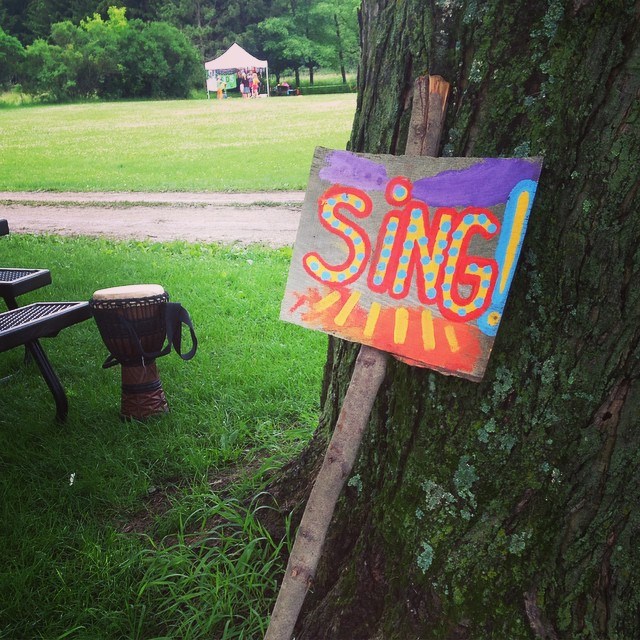 I’ve had amazing experiences singing with women, and when I lead women’s groups I also feel that fear of leading song—of bringing that to the table—because it is so vulnerable. What do you recommend for women to support each other in that way?
I’ve had amazing experiences singing with women, and when I lead women’s groups I also feel that fear of leading song—of bringing that to the table—because it is so vulnerable. What do you recommend for women to support each other in that way?
Just sing together. Somebody needs to start it. You don’t need to wait until you’re perfect. There’s so much perfectionism. That’s what had me. My particular mixed cocktail of dread was “you shouldn’t do anything until you’re perfect,” which is a pure guarantee you won’t do shit until you’re dead. Waiting until it’s good enough or you’re competent enough or you have enough degrees or approval, it’s like oh fuck that. You can write that. [Laughs.]
Really, when you look around, we don’t have that kind of time. We’re past it now. It’s a time to be bold and imperfect and well-meaning. Start over three times, who cares? I would rather hear somebody do that shaky vulnerable thing than some self-assured person be flawless. There’s nothing interesting about flawless. It’s boring.

